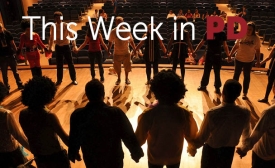culture
A relationship that used to be characterised by the 1969-invoked “change through rapprochement” and “partnership on eye-level”, has seen a rapid cooling over the course of the last two years. Germany and Russia used to be close partners with vibrant exchange on the political, economic, social and cultural levels.

Headlines explored the effectiveness of global soft power strategies
China is eagerly trying to win hearts and minds in politically and economically crucial states, especially those with abundant natural resources. In foreign policy terms, this is a push for what’s widely known as “soft power” – the ability to win other states over to specific goals without the use of force.It is a major priority for Beijing.
The Rebalance author Mercy Kuo regularly engages subject-matter experts, policy practitioners, and strategic thinkers across the globe for their diverse insights into the U.S. rebalance to Asia. This conversation with Ambassador Julia Chang Bloch – Founder and President of the U.S.-China Education Trust and the first Asian American to hold the rank of U.S. ambassador – is the 70th in “The Rebalance Insight Series.”
Creating a strategic communications plan for Ukraine was a hot topic at the 5th annual Tiger Conference, organized by the Kyiv Post on Nov. 29 in Kyiv. Communications experts discussed how the nation can go from zero to an internationally recognized brand by asserting clear and positive message about its identity, history and values.

Headlines explored the various ways cultural diplomacy can connect communities.
History shows that cities have tended to embrace international opportunities in waves and cycles. They rarely break out into global activity by themselves. Cities participate in collective movements or networks to take advantage of new conditions, and often their demise or withdrawal from a global orientation is also experienced jointly with other cities as circumstances change, affecting many at once.
After many months of wrangling between the government and the opposition parties a compromise has been achieved over what has come to be known as the “Backpacker Tax.” Legislation to tax young foreign workers at 15 percent from the first dollar they earn will now pass the Senate. [...] These visas were initially designed as a form of “cultural exchange.”







